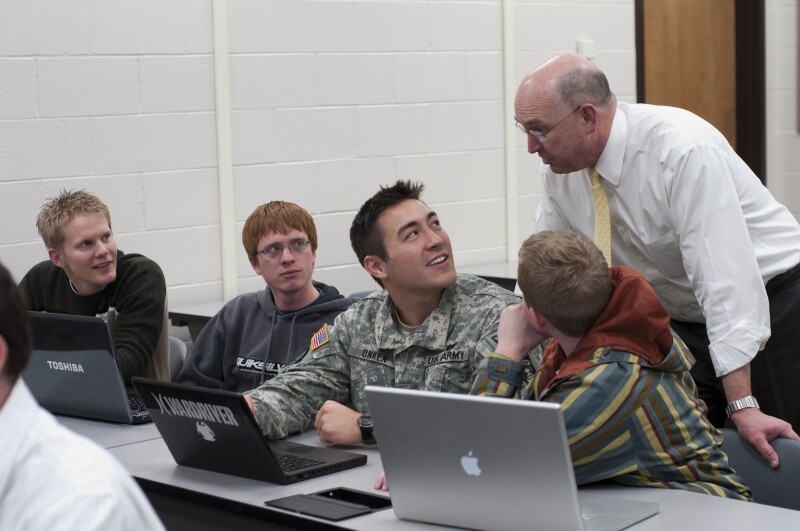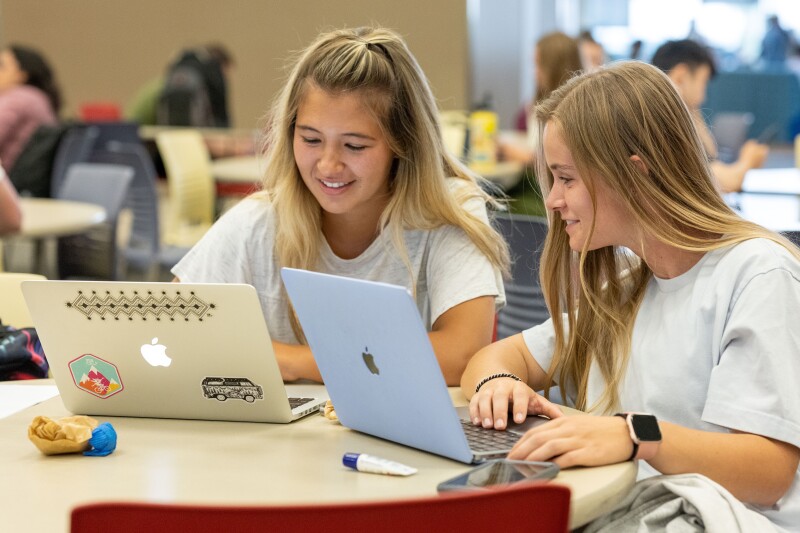Support Network

- Surround yourself with supportive friends. Service opportunities are often a great place to meet these types of people.
- Choose friends that respect the fact that you need time to get your homework done.
- Form study groups. These people often have the same academic goals as you.
- Build positive relationships with instructors.
- Frequently visit with your advisor.
- Talk about your goals with your family.
- Ask advice from your family and help them be an involved part of your life.
Spiritual Preparation

- Follow the honor code.
- Apply the principles of the BYU-Idaho Learning Model
- Be able to say "I’ve done all I can do" the Lord will provide the rest. Living in accordance with the gospel helps us to be worthy to receive His assistance.
Purpose/Attitude

- Decide on a career and a major.
- Visit with your academic advisoror the career advising centerto make a graduation plan outlining which classes you will take and when you will take them.
- Write down a purpose statement outlining your reason for being here including:
Why you are here?
What do you plan to achieve while here?
How long do you plan on being here? - Set academic goals for each of your courses.
- Refer to your graduation plan and long-term goals frequently. Always ask yourself, “Is what I am doing now leading me to where I want to be in the future.”
- Know what it is you want to get out of your education.
Self Management

- Monitor your time for three days in half hour increments. Then add up how much time you spent sleeping, studying, going to class, working, relaxing, traveling, eating, etc. This will help you see how you currently use your time, and if adjustments need to be made, you will see where.
- Prioritize activities. Assign each item a priority rating, and assign each "A" priority a time slot. ("To-do Lists" Article) ("To-do Lists" Worksheet)
"A" priority is assigned to tasks that have high value to you. These are tasks that you want to do because they will help you meet your goals. Also included in this category are tasks that have immediate deadlines.
"B" priority is assigned to tasks that have medium value.
"C" priority is assigned to tasks that have low value; these tasks can be put off or left undone entirely. - Ask yourself two questions.
"Is what I'm doing now helping me achieve my goal
"What will happen if I don't do this?" - Make and use a semester calendar so as to see ahead of time when exams and projects are due. Projects can be more easily completed if broken down into segments, and due dates are set for each segment.
- Develop a weekly schedule including specific times to study specific subjects. Keep in mind the rule of thumb that for every hour spent in class you should dedicate two hours studying. ("Developing Your Study Schedule" Article) ("Developing Your Study Schedule" Worksheet)
- Learn to say NO when others want you to play before studying.
- Use the "idle time" between classes wisely, even if it's only 5-10 minutes, by studying notes or flash cards.
- Treat school like an 8-5 job. Dedicate this time solely to your academics. By following this rule, your evenings should be available for other activities.
- Don't schedule back to back classes.
- Decide what blocks of time will be available for study and then divide that time into one-hour time spans.
- Try to study the more difficult subjects first. (See Eat That Frog Movie - 2 Minutes)
- Schedule your time so that you can study before discussion classes and after lecture classes.
For more time management tips, sign up for a .5 credit time management module.
Avoiding Procrastination

- Motivate yourself to work on a task with thoughts such as "There is no time like the present."
- Prioritize tasks you have to do.
- Work on difficult and/or unpleasant tasks first.
- Commit yourself to completing a task once started. Reward yourself whenever you complete a task.
- Work on tasks as part of a study group. This will help you to better focus.
- Break large tasks into small manageable parts.
- Get help from teachers and other students when you find a task difficult.
- Make a schedule of the tasks you have to do and stick to it.
- Eliminate distractions that interfere with working on tasks.
- Take breaks when working on a task so that you do not wear down.
- Work on a task you find easier after you complete a difficult task.
- Find a good place to work on tasks.
Schedules

If you find that you have a hard time motivating yourself to do homework, then it would be a good thing to think about making a schedule for yourself.
Benefits of making schedules:
- Helps prioritize your time better and give you self-discipline.
- When you take time to plan, there is less of a chance you will talk yourself out of studying.
- As you accomplish your tasks you gain incentive and motivation to continue in this organized way.
Prioritizing

Learning how to prioritize friends and schoolwork is often very difficult. Friends are obviously more fun than homework and there are many fun activities on and off campus, but the homework needs to get done nonetheless. By prioritizing your time wisely it is possible to make time for both.
The main reason we are at school is to learn, and even though socializing is a big part of it, it is not the most important.
Here are some tips on how to avoid the temptation of choosing friends over schoolwork:
- Work in the library instead of your apartment—there are less distractions.
- Join an academic club or get outside help. A club or study group provides friends as well as encouragement to do well in school.
- Seek help from your academic advisor. By having someone to report to you’ll have the incentive to finish your work.
Physical Preparedness

- Get 7-9 hours of sleep each night. (Word of Wisdom Video - 2 Minutes)
- Establish consistent sleep and wake schedules, even on weekends. Unlike money, you can't save up sleep and borrow from it later. You need to sleep enough and consistently; catch-up sleep doesn't work.
- By-pass naps for the real thing--nothing substitutes for a full night's rest.
- Exercise regularly.
- Eat a nutritious and balanced diet.
- If personal or family problems weigh heavily on your mind, don't hesitate to use the counseling services.
Social Skills

- Interact with others in ways that are friendly, courteous, and tactful and that demonstrate respect for others ideas, opinions, and contributions.
- Seek input from others in order to understand their actions and reactions.
- Offer clear input of your interests and attitudes so others can understand your actions and reactions.
- Learn to identify which types of situations make you uncomfortable and then modify your behavior to achieve positive results. Learn to become aware of behaviors in other people that prompt you to respond in negative ways and modify your own behavior to turn the situation into a positive experience.
- Accept responsibilityfor your own behavior and do not fear apologizing for errors in judgment or insensitive actions. Asking others for honest feedback about the way you interact with others can be very helpful. Accept the negative feedback along with the positive and make changes accordingly.
- Your non-verbal communication is equally as important as the things that you say. Positive body language is extremely important in your interactions with other people. If your words and your actions do not match, you will have a difficult time succeeding in social situations.
- Fight the urge to respond immediately and really listen to what the other person is trying to communicate. Offering suggestions or criticism before you are certain of the other person's intent can only lead to frustration for both parties.
- Improving your social skills is a process and cannot be accomplished overnight. Trying to improve or change too many things at once will be counter-productive. Choose one or two traits at a time and work on those over a period of time. Learn to take advantage of your personal strengths and make a positive impact on others.
- Maximize your positive personality traits and use them in your interactions with others.
- Learn how to function better in groups.
- Learn how to better communicate with faculty.